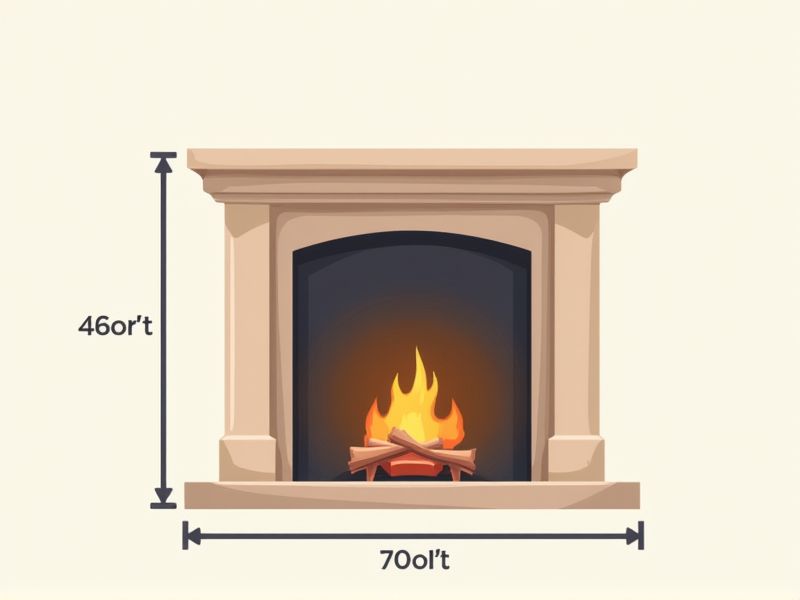
When selecting or building a fireplace mantel, knowing the standard dimensions can help you achieve both safety and aesthetic appeal. Typically, most fireplace mantels are 54-60 inches above the hearth floor, providing a balanced look and maintaining safe clearance from the firebox. The shelf depth usually ranges from 7 to 12 inches, offering ample space for decor without protruding too far into the room. Additionally, the mantel width is often 6-12 inches wider than the fireplace opening on both sides, ensuring the mantel properly frames the fireplace and enhances your room's design.
Height Of Mantel
The standard height for a fireplace mantel typically ranges from 54 to 60 inches above the floor, ensuring it is visually appealing and safe. For a more traditional aesthetic, consider positioning it around 56 inches, which aligns with common design practices. If you have a raised hearth, the mantel's height may be adjusted accordingly, generally increasing by 4 to 6 inches to maintain proportion. Custom designs can vary, but ensuring the mantel's height aligns with your room's overall scale is essential for a balanced appearance.
Depth Of Mantel Shelf
The standard depth of a fireplace mantel shelf typically measures between 6 to 12 inches, accommodating various decorative items or ornaments. A deeper shelf, around 10 to 12 inches, not only provides ample space for displaying photographs and candles but also enhances the visual balance of your fireplace. In contrast, a shallower depth of 6 to 8 inches can create a streamlined look ideal for minimalist designs. When selecting your mantel, consider how the depth affects both functionality and aesthetic appeal in your living space.
Width Of Mantel Shelf
The standard width of a fireplace mantel shelf typically ranges from 6 to 12 inches, providing ample space for decorative accents, candles, or family photos. The overall mantel design often extends beyond the firebox width by at least 4 to 6 inches on either side for a balanced appearance. Height specifications usually recommend a mantel shelf positioned 54 inches from the floor to create an eye-level focal point. Choosing the right width not only enhances aesthetic appeal but also ensures safety and functionality in your living space.
Opening Size
The opening size of a fireplace mantel typically ranges from 36 to 48 inches wide, accommodating various fireplace types and designs. For optimal functionality and aesthetics, it is essential that the mantel extends at least 6 inches on each side of the fireplace opening. Height also matters; standard mantels are often installed 54 inches above the floor, ensuring a balanced visual appeal. Always consider local building codes, which may regulate the clearance and materials used to enhance safety around your fireplace.
Overmantel Dimensions
The standard dimensions for an overmantel typically range from 40 to 60 inches in width and 30 to 48 inches in height, creating a balanced aesthetic above the fireplace. You should consider a depth of 4 to 6 inches to ensure it provides enough visual presence without overwhelming the space. The material choice, often wood or composite, can impact the overall look, with finishes varying from natural wood stains to painted options. Ensure proper ventilation if your fireplace is functional, as this will help maintain the integrity of your overmantel and surrounding decor.
Side Clearance
The standard side clearance for a fireplace mantel is typically 6 inches to ensure adequate safety and ventilation. This distance helps prevent heat damage to the mantel and surrounding structures, reducing the risk of fire hazards. In cases where the mantel is made from non-combustible materials, you may be able to reduce this clearance, but always consult local codes for compliance. Ensuring proper side clearance not only enhances safety but also contributes to the overall aesthetic appeal of your fireplace area.
Hearth Extension
The standard for fireplace mantels emphasizes the importance of a hearth extension, which typically should measure a minimum of 16 inches in depth and extend at least 24 inches in front of the firebox. This extension not only enhances safety by protecting combustible materials from heat and embers but also contributes to the aesthetic appeal of the fireplace area. The material used for hearth extensions can vary, with options including brick, stone, or concrete, each providing unique characteristics and styles. It is essential to adhere to local building codes when installing your hearth extension to ensure both compliance and safety in your home.
Face Height
The standard face height of a fireplace mantel typically ranges from 54 inches to 60 inches above the floor, providing an ideal viewing experience while ensuring safety and aesthetics. For optimal design, the mantel's top surface should extend 12 to 16 inches beyond the opening of the fireplace, creating a balanced visual that complements the fireplace's structure. If you're planning a custom installation, consider incorporating materials that withstand heat and enhance the room's decor. Properly dimensioning your mantel not only enhances the fireplace's functionality but also contributes to the overall ambiance of the living space.
Face Width
The standard face width of a fireplace mantel typically ranges from 4 to 6 inches, allowing for aesthetic balance and structural integrity. When selecting a mantel, ensure its face width complements the overall size of your fireplace, which generally extends 1.5 times the width of the firebox for visual cohesion. Popular materials include wood, stone, and cast stone, with finished options that enhance durability and design. A well-chosen face width can elevate your living space, creating a focal point that enhances both style and function.
Projection From Wall
The standard projection of a fireplace mantel from the wall typically ranges between 6 to 12 inches, allowing for both aesthetic appeal and functional use. A well-proportioned mantel should ideally extend at least 1 to 1.5 times the width of the fireplace for a balanced look. When designing your mantel, consider that a deeper projection can serve as a shelf for decorative items, enhancing visual interest and utility. Maintaining these proportions ensures safety and creates a pleasing focal point in your living space.
